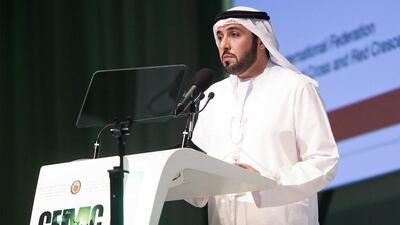ABU DHABI // GCC countries have agreed to closer cooperation to deal with any possible disasters in the region.
The two-day Crisis and Emergency Management Conference 2014 concluded with a recommendation to develop modern technology and detailed emergency plans to be shared with others.
It also stressed the need for research by studying past disasters and learning lessons to introduce disaster measures.
The conference recommended joint training of emergency responders to guarantee best performance in fighting disasters.
Andrew Maskery, the head of risk knowledge for the UN International Strategy for Disaster Reduction, said a disaster could have serious implications for economies, costing businesses billions of dollars.
“We have surveyed 56 countries across the world and found the failure of infrastructure, transport and coordination,” Mr Maskery said.
“It needs more global supply chains for risk and disaster management. Disasters put direct and indirect loses on businesses on small and big enterprises.”
Schools and universities had a vital role in such situations, experts said.
Their syllabuses should include chapters on what to do in case of a range of disasters, so students are prepared.
And educational institutions should be prepared to shelter victims after disasters, if needed.
The conference also decided volunteers should be trained and prepared, and provided with legal protection.
The media has an important role, the conference heard, in circulating safety information before and after a disaster occurs.
Dr Mohammed Al Falahi, of the Emirates Red Crescent, outlined some of the humanitarian responses ready should there ever be a disaster in the GCC.
“We set up operation centre that helps round the clock. It helps victims in all kind of disasters, cyclones, earthquakes, and provide them shelter,” Dr Al Falahi said.
“For example, the Red Crescent trained people during crisis of Cyclone Gonu, which hit UAE’s eastern coast in Fujairah, and prepared five schools for sheltering victims.”
Dr Al Falahi said the organisation helped to evacuate about 500 people from homes in Kalba, taking them to hotels and schools.
Dr Khalid Al Baloushi, president of the Geological Society of the Emirates, also pointed to an increased risk of earthquakes.
“Decades back, we were not hearing about the earthquakes in the Emirates but from 2001 it’s become more frequent,” Mr Al Baloushi said.
“We had quakes reaching up to magnitudes of 4.5. So plans need to be put accordingly.”
The next Crisis and Emergency Management Conference was scheduled for 2016.
anwar@thenational.ae

